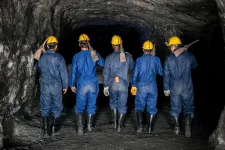AI used in battle against asbestos-linked cancer
International genomics research led by the University of Leicester has used artificial intelligence (AI) to study an aggressive form of cancer, which could improve patient outcomes.
2021-03-26
(Press-News.org) International genomics research led by the University of Leicester has used artificial intelligence (AI) to study an aggressive form of cancer, which could improve patient outcomes.
Mesothelioma is caused by breathing asbestos particles and most commonly occurs in the linings of the lungs or abdomen. Currently, only seven per cent of people survive five years after diagnosis, with a prognosis averaging 12 to 18 months.
New research undertaken by the Leicester Mesothelioma Research Programme has now revealed, using AI analysis of DNA-sequenced mesotheliomas, that they evolve along similar or repeated paths between individuals. These paths predict the aggressiveness and possible therapy of this otherwise incurable cancer.
Professor Dean Fennell, Chair of Thoracic Medical Oncology at the University of Leicester and Director of the Leicester Mesothelioma Research Programme, said:
"It has long been appreciated that asbestos causes mesothelioma, however how this occurs remains a mystery.
"Using AI to interrogate genomic 'big data', this initial work shows us that mesotheliomas follow ordered paths of mutations during development, and that these so-called trajectories predict not only how long a patient may survive, but also how to better treat the cancer - something Leicester aims to lead on internationally through clinical trial initiatives."
While use of asbestos is now outlawed - and stringent regulations in place on its removal - each year around 25 people are diagnosed with mesothelioma in Leicestershire and 190 are diagnosed in the East Midlands. Cases of mesothelioma in the UK have increased by 61% since the early 1990s.
Until very recently, chemotherapy was the only licenced choice for patients with mesothelioma. However, treatment options start to become limited once people stop responding to their treatment.
Professor Fennell in collaboration with the University of Southampton recently made a major breakthrough in treating the disease by demonstrating that use of an immunotherapy drug called nivolumab increased survival and stabilised the disease for patients. This was the first-ever trial to demonstrate improved survival in patients with relapsed mesothelioma.
INFORMATION:
'Clonal architecture in mesothelioma is prognostic and shapes the tumour microenvironment' was first published in the journal Nature Communications, and was supported by the British Lung Foundation, Cancer Research UK and a Hope Against Cancer research grant.
ELSE PRESS RELEASES FROM THIS DATE:
2021-03-26
Bottom Line: Various genetic alterations in circulating tumor cells (CTCs) were associated with clinical outcomes and resistance to hormone therapy in patients with metastatic castrate-resistant prostate cancer (mCRPC).
Journal in Which the Study was Published: Molecular Cancer Research, a journal of the American Association for Cancer Research
Author: Andrew Armstrong, MD, MSc, a medical oncologist at the Duke Cancer Institute Center for Prostate and Urologic Cancers at Duke University
Background: While only a minority of men with mCRPC have primary resistance to the androgen receptor (AR) inhibitors enzalutamide (Xtandi) or abiraterone acetate (Yonsa or Zytiga), most men will ...
2021-03-26
A study with first-time learners of Japanese has measured how brain activity changes after just a few months of studying a new language. The results show that acquiring a new language initially boosts brain activity, which then reduces as language skills improve.
"In the first few months, you can quantitatively measure language-skill improvement by tracking brain activations," said Professor Kuniyoshi L. Sakai, a neuroscientist at the University of Tokyo and first author of the research recently published in Frontiers in Behavioral Neuroscience.
Researchers followed 15 volunteers as they moved to Tokyo and completed introductory Japanese classes for at least three hours each day. All volunteers ...
2021-03-26
March 23, 2021-- A new study published online in the Annals of the American Thoracic Society examines if the source of physician payment for a medical opinion influences whether the physician finds that a coal miner has black lung disease. The study is the first to look at this relationship in the workers' compensation process.
In "Association Between Financial Conflicts of Interest and ILO Classifications for Black Lung Disease," Lee S. Friedman, PhD, associate professor, School of Public Health, Division of Environmental and Occupational Health Sciences, University of Illinois Chicago and colleagues looked at which party reimbursed B-readers--physicians trained and licensed by the National Institute for Occupational Safety and Health (NIOSH) and approved by the U.S. ...
2021-03-26
University of Illinois Chicago researchers are the first to report on the financial conflicts of interest that exist among doctors who review the chest X-rays of coal miners who file workers' compensation claims of totally disabling disease with the U.S. Department of Labor's Federal Black Lung Program.
The UIC researchers found that the determinations of these doctors - who are known as B-readers and who are certified by the National Institute for Occupational Safety and Health, or NIOSH - were strongly associated with the party that hired them.
By analyzing ...
2021-03-26
X-rays, first used clinically in the late 1890s, could be a leading-edge diagnostic tool for COVID-19 patients with the help of artificial intelligence, according to a team of researchers in Brazil who taught a computer program, through various machine learning methods, to detect COVID-19 in chest X-rays with 95.6 to 98.5% accuracy.
They published their results in IEEE/CAA Journal of Automatica Sinica, a joint publication of the IEEE and the Chinese Association of Automation.
The researchers have previously focused on detecting and classifying ...
2021-03-26
The uneven distribution of school closures in the US since September 2020 threatens to exacerbate regional, racial and class-based divides in educational performance, according to research by Zachary Parolin, of Bocconi University's Department of Social and Political Science, recently published in Nature Human Behavior. For example, in October, only 35% of White students were on distance learning, compared with 52% of Black students, 60% of Hispanic students and 65% of Asian students. And schools recording the lowest math scores were 15% more likely to be closed.
Professor Parolin and Emma Lee (Columbia University) found in fact that exposure ...
2021-03-26
Researchers from Queens University, Boston University, University of Toronto, University of Rochester, and Treasury Board Secretariat, Government of Canada published a new paper in the Journal of Marketing that tests a simple, no-cost intervention that can double registration rates, thus helping communities gradually increase the number of prospective donors.
The study, forthcoming in the Journal of Marketing, is titled "Increasing Organ Donor Registrations with Behavioral Interventions: A Field Experiment" and is authored by Nicole Robitaille, Nina Mazar, Claire ...
2021-03-26
Scientists at the Institute for Integrated Cell-Material Sciences (iCeMS) and colleagues in Japan have revealed molecular mechanisms involved in eliminating unwanted cells in the body. A nuclear protein fragment released into the cytoplasm activates a plasma membrane protein to display a lipid on the cell surface, signalling other cells to get rid of it. The findings were published in the journal Molecular Cell.
"Every day, ten billion cells die and are engulfed by blood cells called phagocytes. If this didn't happen, dead cells would burst, triggering an auto-immune reaction," explains iCeMS biochemist Jun Suzuki, who led the study. "It is important to understand how dead cells are eliminated as part of our body's maintenance."
Scientists ...
2021-03-26
Many tropical cyclone-prone regions of the world are expected to experience storm systems of greater intensity over the coming century, according to a review of research published today in ScienceBrief Review.
Moreover, sea level rise will aggravate coastal flood risk from tropical cyclones and other phenomena, even if the tropical cyclones themselves do not change at all. Models also project an increase in future tropical-cyclone precipitation rates, which could further elevate the risk of flooding.
Researchers at Princeton University, the U.S. National Oceanic and Atmospheric Administration (NOAA), and the University of East Anglia (UEA) examined more than 90 peer-reviewed articles to assess whether human activity is influencing ...
2021-03-26
Scientists have identified new genetic clues in people who've had small and often apparently 'silent' strokes that are difficult to treat and a major cause of vascular dementia, according to research funded by the British Heart Foundation (BHF) and published in The Lancet Neurology.
Researchers discovered changes to 12 genetic regions in the DNA of people who have had a lacunar stroke - a type of stroke caused by weakening of the small blood vessels deep within the brain. Over time, damage to the blood vessels and subsequent interruption to blood flow can lead to long-term disability, causing difficulty with thinking, memory, walking and ultimately ...
LAST 30 PRESS RELEASES:
[Press-News.org] AI used in battle against asbestos-linked cancer
International genomics research led by the University of Leicester has used artificial intelligence (AI) to study an aggressive form of cancer, which could improve patient outcomes.


